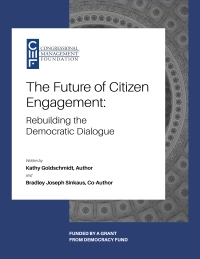"The Future of Citizen Engagement: Rebuilding the Democratic Dialogue" explores the current challenges to engagement and trust between Senators and Representatives and their constituents; proposes principles for rebuilding that fundamental democratic relationship; and describes innovative practices in federal, state, local, and international venues that Congress could look to for modernizing the democratic dialogue.

The report answers the following questions:
- What factors have contributed to the deteriorating state of communications between citizens and Congress?
- What principles should guide Congress as it tries to transform its communications systems and practices from administrative transactions to substantive interactions with the People it represents?
- What models at the state and international level can Congress follow as it modernizes and rebuilds the democratic dialogue?
The findings and recommendations in this report are based on CMF's long history of researching the relationship between Members of Congress and their constituents.
The report was sponsored by a grant from the Democracy Fund.
- Read the press release
- Download the report
- Download the report (CMF Partners)
KEY FINDINGS
- Congress lacks the capacity to meet the demands of a 21st century constituency. Ever-rising district and state populations and communications volumes, coupled with reductions in Legislative Branch staffing and budgets, have left Congress challenged to listen closely to the People, understand their needs, and develop responsive and inclusive public policy.
- Practices on both sides of Member-constituent engagement are facilitating bureaucracy, not democracy. Grassroots advocates, who organize and facilitate most of the communications to Congress, have built their strategies around quantity, not quality. Members of Congress have built their strategies around responding to those who contact them, not on understanding what they're hearing and reaching out to those they're not hearing from. This has caused the democratic dialogue to be more of an administrative task than a democratic opportunity.
- Congressional engagement should foster trust in Members, Congress, and democracy. Trust in Congress and government is at nearly an all-time low, and the People do not feel like they are being heard. As the branch of the federal government designed to be close to the People, Congress bears significant responsibility for rebuilding that trust through better engagement with the People.
- Congress should robustly embrace and facilitate the People's First Amendment rights. Historically, the First Amendment right to petition government for a redress of grievances was central to Congress' work, but it is no longer well-understood, nor does it resemble the practices of early Congress. The First Amendment rights to speech, assembly, and freedom of the press are also critically important to the relationship and communications between Congress and the People. Congress must fully understand, embrace, and facilitate these rights throughout the legislative process.
- Senators and Representatives should strive to engage with a diverse sample of their constituents, not just those who vote for them or seek to influence them. Congress has largely become a reactive institution, responding to those who reach out, who vote, or who have gained public prominence or authority. This leaves a significant number of Americans out, often including the most vulnerable. Congress must facilitate processes which seek to hear from those not typically engaged so their voices may be included in public policy decisions.
- While individual Members should prioritize engagement with their own constituents, Congress should develop additional venues for public policy participation and engagement. Historically, the right to petition was facilitated at the chamber level. Anyone could submit a petition to the House or Senate, and any Member could move it forward. A vestigial version of this process still exists, but no longer requires due process, transparency, or response. Modernizing citizen engagement will require developing new venues for the democratic dialogue to occur, both dependent on, and independent of, individual Senators and Representatives.
- The People should be honest and transparent in their engagement with Congress. When seeking a redress of grievances in court no one balks at the stringent requirements for honesty, transparency, and due process. No one tries to sway judge and jury by inundating them with messages or intimidation. In fact, if they use such tactics they are held to account and often punished. Yet, when seeking a redress of grievances in Congress, these tactics are expected and sometimes rewarded. In modernizing the democratic dialogue, we must seek ways to facilitate honesty and transparency in congressional engagement.


